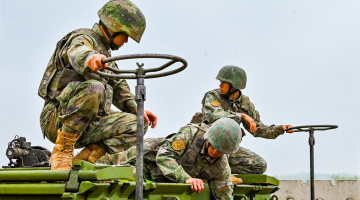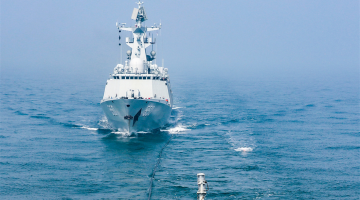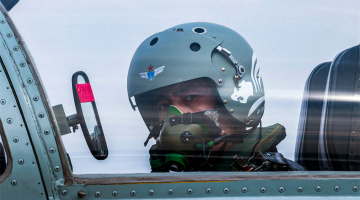
China and the US could aviod Thucydides' Trap, said Chinese experts. Photo: VCG
On the 100th anniversary of the World War I (WWI) Armistice, some voices in the West are hyping a China-US war, and implying that China is "a threat to world peace." However Chinese experts said that China is a key power to safeguard world peace rather than "another German Empire before WWI."
A century after WWI, the Western world should wake up from the dream of hegemony, Chinese analysts said on Monday.
Graham Allison, Douglas Dillon professor of government at the Harvard Kennedy School, said in his article, "The next great war," that China and the US are unlikely to avoid the Thucydides' Trap. Unless China "fails in [its] aim to 'make China great again,' China will continue to challenge, and in many arenas, displace the United States from its accustomed position at the top of the global pecking order."
The article was published on the Washington Post Friday.
Thucydides' Trap is a phrase coined by Allison who postulates that "when one great power threatens to displace another, war is almost always the result," according to Allison's article published on Foreign Policy on June 9, 2017.
"Thucydides' Trap is only Allison's personal conclusion based on the Western world's experience, not necessarily suited to the Eastern world," Li Haidong, a professor at the China Foreign Affairs University in Beijing, told the Global Times.
Li noted that they could only partly reflect China-US relations when US scholars use "Thucydides' Trap" to explain the bilateral ties.
The US considers China a strategic competitor, but this doesn't necessarily mean that they will become enemies preparing to fight with each other, he said.
Li Daguang, a professor at the National Defense University of the People's Liberation Army (PLA) in Beijing, told the Global Times on Monday that such a theory is only another form of the wheezy "China threat theory".
Allison said in his article that China and the US are facing a similar situation that Athens and Sparta or Great Britain and the German Empire had faced in the past. "The past 500 years have seen 16 cases in which a rising power threatened to displace a ruling one. Twelve of these ended in war."
However, Li Haidong opposed such comparison, saying that European hegemonic powers at that time were struggling for territories, resources and colonies, but today's international community are cooperating and working together with each other for a common development.
"The old world is divided, but now, due to globalization, the members of the international community are closely connected to each other," Li Haidong told the Global Times on Monday.
Li Daguang also said that the current international community stresses multilateral "checks and balances" and is no longer a world where a hegemonic power can act without constrains.
It was the leaders of the German Empire who misjudged their country's situation, so much so that they made a wrong strategic decision that brought wars between Germany and other major European countries, Li Haidong noted. "On the contrary, China upholds globalization, free trade and multilateralism, highlights mutual trust in dealing with the rest of the world, including the US."
Li Haidong noted that WWI was caused by many accidents. But as China and the US move to establish an accident prevention mechanism with many communication channels to manage and control crises and frictions from escalating, the possibility of a war between the two is low.
A key power for peace
Since the late 1980s, China has never used war to solve problems in Asia, although the region has many unsolved "powder kegs" that would potentially cause wars, such as the Korean Peninsula nuclear issue, China-Japan disputes in the East China Sea, the Taiwan question, the South China Sea issues and China-India border issue.
"All of these issues involve China's national security or sovereignty, and China has the most powerful military force in this region, but it still insists on using political and peaceful measures to deal with these issues. This is enough to prove China's determination to safeguard peace and regional stability, because a peaceful environment in the region is essential for everyone," said a military expert at a Beijing-based PLA academy. He asked anonymity.
Unfortunately, unlike Asia, other regions like Europe, the Middle East and Africa are suffering from regional conflicts, and many of them are directly related to the US, he told the Global Times.
He said China has never sent naval vessels to provoke the US in its territorial waters, but the US is strengthening its military presence in the Asia-Pacific region and makes many dangerous moves that threaten China.
"So if the US and China could not avoid the Thucydides' Trap someday, it would not be China's fault. The US is the one that should be blamed."









